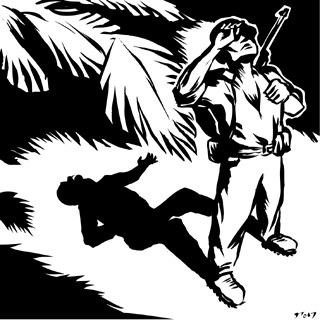Letters at 3AM
One Bloody Testicle
By Michael Ventura, Fri., Feb. 22, 2002

War movies are back. Cinema has achieved an explicitness of expression and technique that allows combat to be shown more realistically than ever -- Band of Brothers, Black Hawk Down, Saving Private Ryan, The Thin Red Line, and next week's We Were Soldiers may be as close as noncombatants can get to the physical verities of war's particularly chaotic violence. But the best of the old war movies, while less physically realistic, emphasize dimensions that are less noticed in these new films -- perhaps because the best classic war movies were directed by combat veterans.
In 1946 Lewis Milestone (who fought in the First World War) did something virtually unheard of at the time: On a shoestring budget he produced A Walk in the Sun independently, free of studio control. His actors were young and unknown. The viewer knows the box-office star will live at least until the end of the movie (as in Saving Private Ryan); in A Walk in the Sun we have no clue who will die, who will crack, who will rise to heroism or fall to cowardice. We invest our attention and affection without knowing what we'll get back. It's the only honest way to shoot a war film.
Milestone's soldiers are frightened, uncertain, and angry. They constantly bicker, constantly question their orders, constantly smoke. Unable to use outright curses due to censorship, Milestone indicated how GIs really talked by substituting "loving" for "fucking," trusting his viewers to understand the usage. One soldier sarcastically cites the Infantry manual. "What page?" his buddy asks. "I forget the lovin' page." "You better forget the lovin' page." The dialogue has the absurdist flavor that combat veteran Joseph Heller would make famous in his 1959 novel Catch-22 -- a combination of Brooklyn banter and Waiting for Godot. A soldier says that "two guys" told him there's a German machine gun up ahead. "Where's the machine gun?" "They didn't tell me." "Who didn't tell you?" "The two guys." It's not meant to be funny. They're wise-mouthing to deal with their fear. They're not heroes. They're soldiers. The platoon sergeant cracks, clutches the ground weeping, and will not move forward -- yet no one blames him, no one accuses him of cowardice. "You're crying 'cause you're wounded. You don't have to be bleeding to be wounded. You've just had one battle too many. Go ahead, keep crying, we understand." Their pity for him is as taken-for-granted as the fact that they are doing something they don't want to do for reasons they no longer understand. A man is shot by a sniper while speaking. His buddy says: "In the middle of a word. And they got him right in the mouth. In the middle of a word." Though orders are usually (but not always) followed, there's little respect for authority. A sergeant tells a private to give an order to another man; the private replies, "Tell him yourself, you're wearing the stripes." The strangest refrain is how, when anybody gets killed, someone will say softly, "Nobody dies," and somebody else will echo, "Nobody dies." A crazy statement, flatly contradicting their experience, but they say it anyway, for no other reason but that one says strange things in Hell.
Battleground (1949) was also directed by a veteran of the First World War, William A. Wellman, who received the French Croix de Guerre (their Medal of Honor) and five U.S. battle citations. Again most of the actors are unknown, and again this creates uncertainty as to who will live and die. Like Milestone's soldiers, Wellman's bicker, complain, joke, are irreverent toward authority, and smoke constantly. They sing a fatalistic marching song, universal among GIs at the time, about civilians (called "Jody") who are sleeping with their gals back in the States: "Ain't no use you goin' home! Jody's got your gal and gone! Ain't no use you feelin' blue! Jody's got your sister too!" Sarcastically one says, "When I get home just gimme a hot dog and a slice of that pie! Am I gonna kick if I don't get my job back? No sirree." They don't even know where they are. They make bets about whether they're fighting in Belgium or Luxembourg. Their refrain when kidding a comrade, is, "He found a home in the Army!" -- a statement which, to them, is the height of lunacy. They're all scared and they all admit it. When surrounded and fired on, one man's heroism gets them out of it. He's wounded in the action. As they're carrying him back to the field hospital he says, "Just drop me off at the psycho ward. Why did I have to get up and start firing?!" "Good thing somebody did." "Yeah, well it didn't have to be me." Heroism is seen by the heroes themselves as an aberration, a fit in which one soul forgets his best interests and performs in a manner that almost embarrasses him. One soldier tries to run away from the battle and instead merely runs into another firefight in which he has no choice but to participate -- and, as in A Walk in the Sun, he's not blamed by his comrades. Ambiguity is the order of the day. Everyone is a coward. Everyone is a hero. At the same time. Just by virtue of being there. And no one is there because he wants to be. "I was scared to death," a soldier says, and another tells him, "You just joined the biggest club in the Army. Everybody's a member."
Sam Fuller saw combat in Africa and Europe with "the big red One," the Army's 1st Division. He landed at Omaha Beach on D-Day, fought his way across the continent, helped liberate a concentration camp, and was awarded the Silver Star, the Bronze Star, and the Purple Heart. Late in his life Fuller told the story of the war he'd experienced in The Big Red One. You would think a 69-year-old man would fondly remember and glorify the most profound experience of his youth. He remembers fondly enough, but he glorifies nothing. As Fuller tells it, he and his squad survived the war by coldly, mercilessly, and nonchalantly putting "wetnose" replacements in the most danger, and mopping up after them. Fuller and his comrades are careful not to learn the names of the wetnoses. "We'd come to look at all replacements as dead men who temporarily had the use of their bodies." Not only does Fuller's squad display no guilt about their behavior; they're proud of it, and make no pretense of hiding their attitude from the doomed replacements. One wetnose is wounded by a trip-wire mine. The sergeant tells him, "They're not designed to kill you, just to castrate you." Then, with glee: "There it is, I found it!" While the wounded rookie looks on in horror, the veteran sergeant picks up one bloody testicle and throws it away, saying with a sneer, "You can live without it. That's why they gave you two."
The Big Red One begins with a huge crucifix (all that's left of a church) that stands in the middle of a field littered with dead soldiers. The Jesus on the crucifix stares wide-eyed and baffled at the behavior of humanity. Ants crawl in his eye sockets. So much for the hope of Western civilization.
But when Fuller's squad liberates the concentration camp, that same sergeant behaves very differently. He sort of adopts an emaciated Jewish boy of about 11. The boy is baffled and even threatened by the sergeant's kindness, but nevertheless he responds, and the sergeant gives him something to eat and picks him up and carries him on his shoulders. There, on the sergeant's shoulders, the exhausted, horrified, hunger-ravaged boy dies. The narrator relates (as we watch), "He [the sergeant] walked for half an hour before he could bring himself to put the kid down."
Then the sergeant wounds a German soldier, but is told by his squad that Germany's surrendered and the war has been over for hours -- so they frantically tend the wounded German and save his life. The narrator relates, "Saving that Kraut was the final joke of the whole goddamn war. I mean, we had more in common with him than with all those replacements who got killed whose names we never even knew: We'd all made it through, we were alive." The narrator intends to write about his experience. "I'm gonna dedicate my book to those who shot but didn't get shot. To survive is the only glory in war, if you know what I mean."
A Walk in the Sun, Battleground, and The Big Red One -- the testimonies of combat veterans, focus on the common foot soldier, a figure portrayed with great respect but no glorification. Officers, by contrast, are almost entirely absent in these films; when officers do appear, they are usually treated with contempt. The message is clear: Those who do most of the fighting and dying are common working men who'd rather be elsewhere and don't much like college kids; officers (of usually affluent backgrounds) pretend to be in control, but the GIs know that in war no one is in control; the GIs are willing to fight for their country, but tolerate no bullshit. The testimony of these combat-seasoned directors is practical, irreverent, devoid of glory, and resistant to meaning. A soldier in Battleground defines PFC [private first class] as "praying for civilian" -- praying to be a civilian again. Another soldier in Battleground says of a buddy's behavior: "How do you know what he was thinking? How do you know he was thinking anything at all? Things just happen, and afterwards you try to find out why you acted the way you did." ![]()








